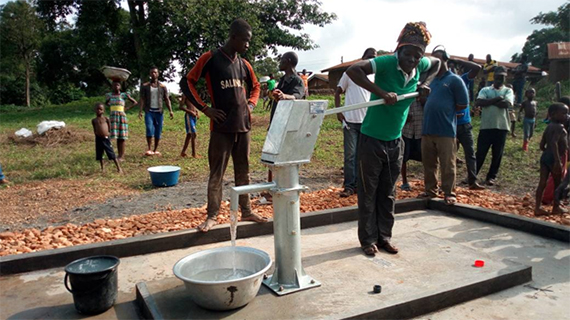
Villagers in Basari Akura use a newly installed pump.
By Johnson Pewudie, Rotary Club of Hohoe, Ghana
By Johnson Pewudie, Rotary Club of Hohoe, Ghana
Basari Akura is a predominantly farming community in the Volta region of Ghana. The nearly 1,000 people that live there lack access to sufficient clean water, undermining health, education, and productivity of both adults and children. My club, the Rotary Club of Hohoe, is working with USAID and the government to extend the benefits of the Rotary-USAID Partnership water, sanitation and hygiene program in Ghana to Basari Akura.
On 27 July, I visited Basari Akura with the partnership program leaders in Ghana: Ako Odotei, chair of the project management committee and Theophilus Mensah, the project manager. We were also joined by a member of the Rotary Club of Ho, the other Rotary club in the Volta Region, and a local representative from our USAID partner, Global Communities.
We went with community leaders to the site of a new borehole that Rotary and USAID are drilling about 500 meters from a stream that inhabitants depend on for water. The project manager made us aware that the water test and pump test results were satisfactory. The chair of the community’s water and sanitation committee (WATSAN) who was with us expressed his joy at the addition of a new water source, which in his words, will ease the pressure and struggles for clean water.
We learned that the 935 people living in Basari Akura depend on an existing borehole, which was insufficient for the number of inhabitants. Squabbles and even fights erupt due to misunderstandings about whose turn it is to use the borehole. Students spend most of their after school hours fetching water instead of studying.
The slow-flowing stream that supports the current borehole, as a source of water, is very bad. The water was greenish. We saw and heard frogs around, as well as cattle foot prints in the mud. We were told that the stream dries up in the dry season. I would have never imagined that, within the same country, some have to resort to frog-infested water, which they share with cattle, while others, especially in urban centers, enjoy clean tap water.
The community leaders told us that they used to suffer from Guinea worm until the arrival of the existing borehole. The most common current ailments are malaria and diarrhea.
Despite the challenges, we noted that the community has a very good WATSAN committee of nine members, five of those women. The committee has a good accounting system, collecting a monthly fee from users of the existing borehole, depositing it in a bank, and using it for maintenance. They had already designated two people to be their pump maintenance personnel.
By the end of our visit, we had the rare privilege of witnessing the first flow of water from the new borehole funded by the Rotary-USAID Partnership. It was clean and flows well. It is our intentions and hope to continue working in collaboration with our partners and Basari Akura to ensure that the community maintains good management practices of the water facility, and also explore other avenues we can to make life and health better for the community.